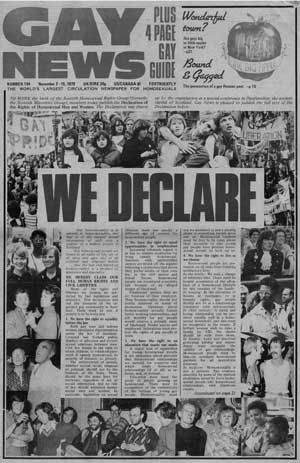Scots
campaign to be based on the Declaration
At the last meeting of the Scottish Minorities Group, before
it turned itself into SHRG (the Scottish Homosexual Rights
Group), members urged that the organisation should take up
a wider and much more forthright stand on gay rights. There
was criticism that the group was concentrating too narrowly
on Robin Cook's law reform Bill which the Labour MP is still
trying to get through the House of Commons.
Abstract: One response to change its name to a be more explicit.
The other, a forthright declaration. Bishops, MPs, local
councillors, doctors & teachers may find the declaration
thrust into their hands.
SHRG President, Malcolm Crowe said that there would be pamphlets
aimed at uncommitted gays who use pubs and clubs.
|
 To
mark the birth of the Scottish Homosexual Rights Group
(formerly the Scottish Minorities Group), members today
publish the Declaration of the
Rights of Homosexual Men and Women. The
Declaration was drawn up by the organisation at a special
conference in Dunfermline, the ancient capital of Scotland.
Gay News is pleased to publish the full text of the Declaration
below. To
mark the birth of the Scottish Homosexual Rights Group
(formerly the Scottish Minorities Group), members today
publish the Declaration of the
Rights of Homosexual Men and Women. The
Declaration was drawn up by the organisation at a special
conference in Dunfermline, the ancient capital of Scotland.
Gay News is pleased to publish the full text of the Declaration
below.
We Declare
... that homosexuality is as natural as heterosexuality, and that it
is the natural sexual orientation of well over a quarter of a million
people in Scotland.
... that homosexual people are found in all walks of life, are of all
races and ages, and of all political and religious beliefs
... that the fear and hatred of homosexuality is a product of ignorance
and insecurity.
WE HEREBY CLAIM OUR FULL RIGHTS AND CIVIL LIBERITES.
Many of the rights and liberties we possess are subverted by bad legislation
and prejudice. This declaration sets out the demands of the organised
gay community in Scotland. These must be met if society is to be truly
just.
1. We have the rights to equality
before the law.
Both gay men and lesbian women encounter discrimination under
the law of Scotland. Criminal law forbids public displays
of affection and private sexual relations between men.
Civil law denies us the right to adopt children, to retain
employment if openly homosexual, to security of tenancy,
to privacy.
The enforcement of morals, whether sexual, social, religious
or political, should not be the business of the State. There
should be the same laws for everyone, regardless of sex or
sexual orientation, and no rule of law should prejudice homosexual
men and women. In particular, legislation on sexual offences
must not specify a different age of consent for homosexual
people. 2. We have the right to equal opportunities in employment.
Industrial tribunals regard it as fair to dismiss employees for being
openly homosexual. Teachers with unblemished careers are,
struck off the register following a conviction that shows they prefer
adults of their own sex. In the civil service and armed forces, homosexual
people are considered a security risk because of an alleged danger
of blackmail.
Employees private lives are no business of their employer. Thus homosexuality
should not justify dismissal Or denial of promotion. Openness about
homosexuality actually fosters better working relationships, and job
security for gay people would remove a primary cause of blackmail.
Trades unions and employers’federations must protect the rights
of gay people at work.
3. We have the right to an education’ that,
meets our needs.
A major area of oppression for young homosexual people is sex education
which pretends that heterosexual relationships are natural for everyone
and which treats homosexual relationships (if at all) as inferior,
sick, or deviant.
Education must meet the needs of people growing up homosexual. There
must be recognition, of the authenticity of the feelings of young gay ‘people.
Homosexuality must
not be dismissed as just a passing phase or something people grow out
of. Homosexual teachers must be free to be open about their sexuality
so that young gay people have positive homosexual people to look up
to.
4. We have the right to live as
we choose.
Homosexual people are prevented on all sides from building satisfactory
lives.
In the family: We seek a change of attitudes here. There must be honest
acceptance of the adoption of a homosexual lifestyle by any. member
of the family. In housing: In the allocation of houses or mortgages,
or in tenants’ rights, gay people should not b& at a disadvantage
compared with heterosexuals. In child custody: A stable and loving
relationship can be provided equally well in a homosexual household,
and this must be recognised in the courts. If lesbian women wish to
raise a family by AID, the choice should lie with them alone.
In kinship:
Laws and practices governing kinship and dependency must recognise
the validity of gay relationships. Homosexual people must be free
to nominate homosexual partners for . all next-of-kin purposes.
In medicine: Homosexuality is not a sickness. The contrary assertion
by some of the medical profession serves to force homosexual people
into heterosexual relationships, with disastrous results.
(continued on page 2)
|